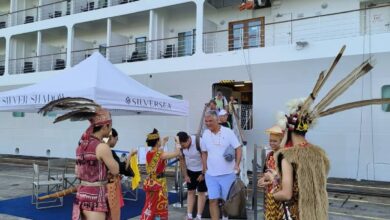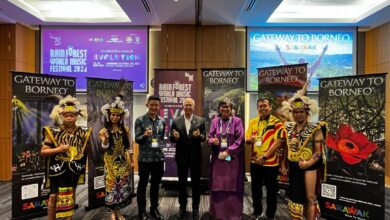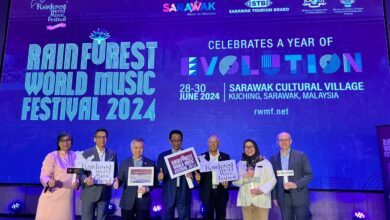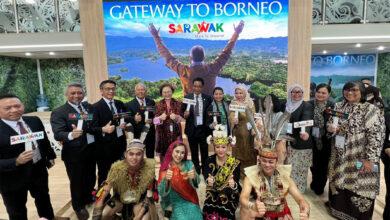Immerse yourself in the authentic longhouse experience

Leave the hustle and bustle of city life behind and experience living with the indigenous people of Sarawak. Replace hot hotel showers with cool and refreshing river dips. Forget artificial air-conditioners as you enjoy the cool and fresh air of the natural surroundings. Get connected to nature as you embark on an authentic longhouse experience in Sarawak.
Sarawak is truly a celebration of different cultures. Malaysia’s largest state is home to 27 ethnic groups speaking 45 different languages and dialects. Each group boasts their very own unique stories, beliefs, traditions and cultures.
Enjoy the culinary delights of the different cultures, dance to traditional music played by master musicians on unique Sarawakian instruments, listen to the stories, folklore and legends of the respective ethnic groups and discover the meanings of the tribal tattoos. No indigenous-living experience is more complete, authentic and fulfilling than spending a day with the local community at a longhouse — usually located approximately an hour’s drive away from the nearest city or town. Other longhouses may require boat rides that cut through forests.

Image source: Damian Pankowiec
What is a traditional longhouse experience?
Sarawak is a constantly evolving state and this has seen many of the longhouses being rebuilt with bricks and mortar. Despite this, there is still a number of longhouses located all across the state that has remained true to their roots. Many of these also provide lodging for guests to provide them with an authentic longhouse experience.
Bear in mind though that the experience provided aims to be as genuine as possible. As such some of these longhouses may not have access to direct electricity and may require generators to keep electrical appliances and devices running. It is therefore recommended to bring your own portable power sources for your needs. But fret not – you would probably not use your smart devices much as the longhouse communities have plenty of activities planned for you to partake in and enjoy.

Image source: Robas
A traditional longhouse is – as the name implies – a house that extends in length. It can accommodate up to thirty families. The house stands on stilts and a large area of the structure is made up of a long communal space called ruai. Upon arriving at a longhouse, you will be immediately greeted by the chief and the community with the traditional welcoming ngajat dance alongside tabuh music. Thereon, let the food and celebrations begin.

Image source: Dave G. Houser
Activities
A stay at the longhouse truly allows you to take a step back and smell the roses. You will find yourself enjoying the views and the morning sunlight as you lounge and relax at the ruai in the mornings. Watch the locals go about their daily activities as they harvest their crops. The surrounding land, functions like an extension of the longhouse. It is usually laden with crops, produce and farm animals. These lands are owned by the families of the community, but some families own bigger farming plots further from the longhouse of which will require longer travel.
If you do not mind mosquito bites – as well as a bit of dirt under your nails – you might enjoy keeping the locals company during their bumai business. Sipping cold coffee from plastic flasks in the afternoon during bumai breaks and enjoying the lush-green view and fresh forest air is a humbling and rewarding life experience.

Image source: Matyas Rehak
If you are more of an indoor person, you can choose to partake in a number of activities at the ruai. When not busy raising the young ones, the local women will carry out handicraft projects. These include weaving mats and baskets from rattan. On some occasions, you may get to observe an indigenous woman weaving ceremonial cloth on a large wood loom. You can also give it a try and see if this is a skill you can bring home with you.

Image source: Sarawak Travel
Eat like the locals
Breakfast is the most important meal of the day and the Sarawakians know this. Do not be surprised if you are served a meal as heavy as that of lunch and dinner for breakfast. If your refreshing morning cold bath of gathered water does not wake you, the bitter but aromatic freshly brewed coffee prepared by your host will perk you up after a good night’s sleep on a floor mattress.
In the evening, dinner is often served on the rattan mat spread out on the floor. The local delicacies are wide-ranging – from chicken cooked in bamboo, the Dayak’s tomato-like sour eggplant cooked with clear soup and dried fish, to fermented Chinese herring or kasam terubok, stir fried cangkuk manis and taro roots.
Priceless experiences and memories

Image source: Sarawak Tourism Board
As you start preparing to leave for your home, take one last look around the longhouse. You will be amazed at how sturdy the structure is even after decades of withstanding the hot and humid climate of Sarawak and the tropical storms associated with the Borneo rainforests. You feel the cool rattan mats beneath your bare feet. You hear the morning roosters crowing from their coops. The children will gather in the ruai to observe with keen eyes as you gather your belongings, and to bid farewell.
You take one last Instagram photo with your host and the chief. You strap on your sandals at the bottom of the stairs and make your way back to the city with a gift of home-brewed rice wine gifted by your host, a warm heart filled with priceless memories and an amazing authentic experience.




